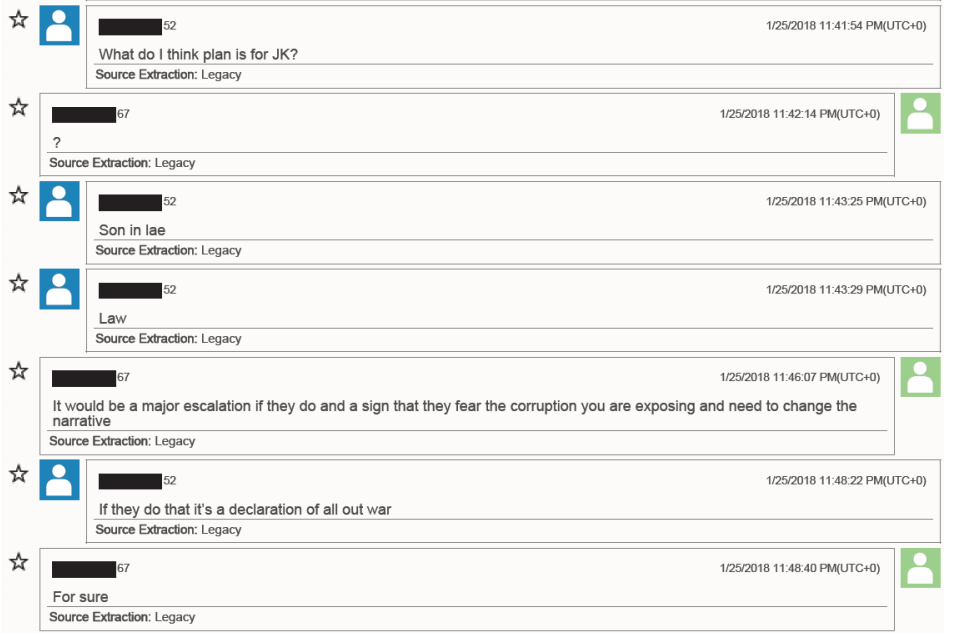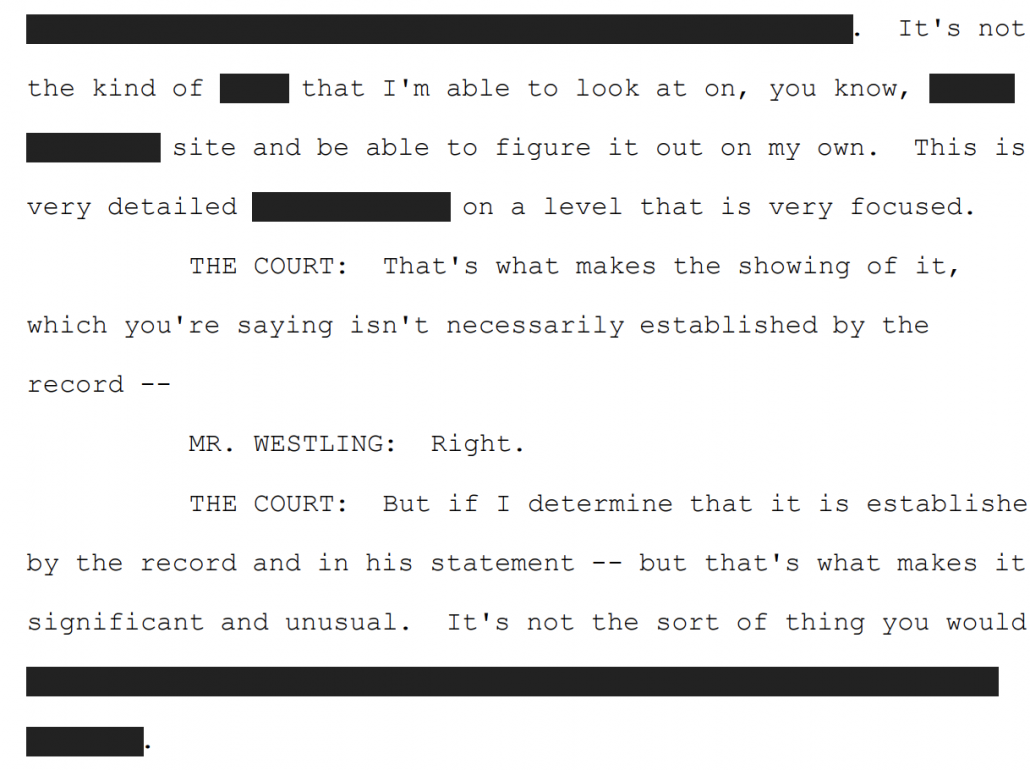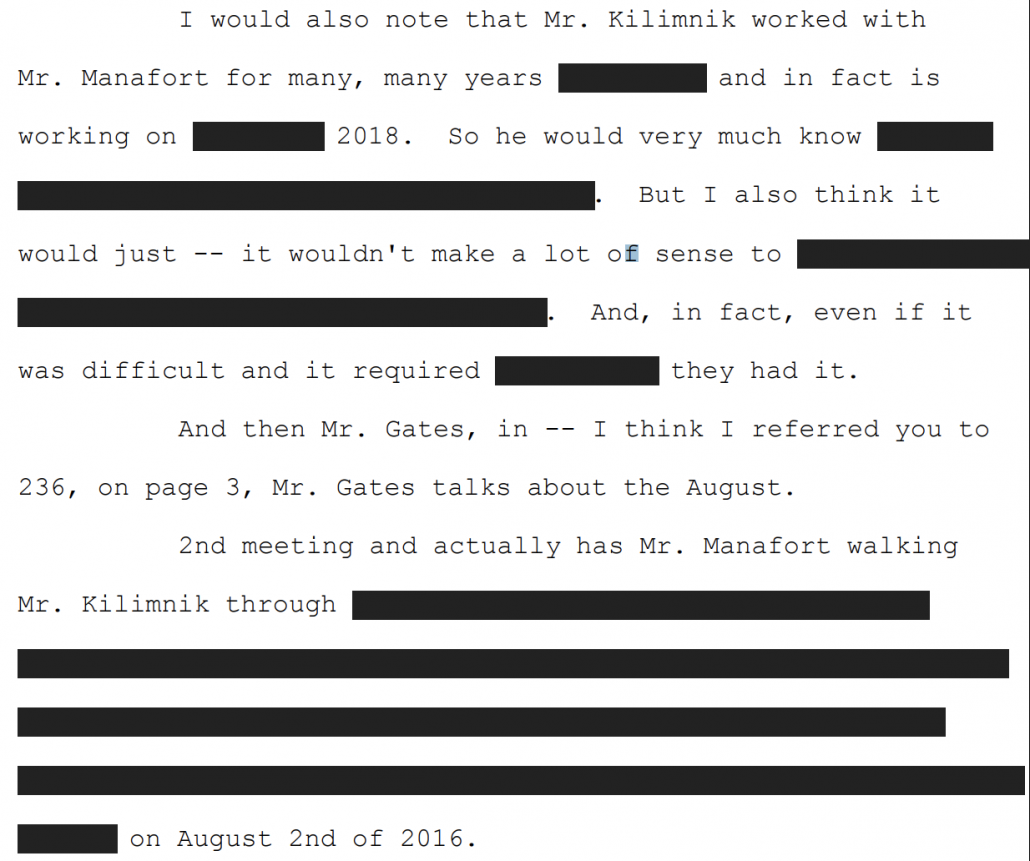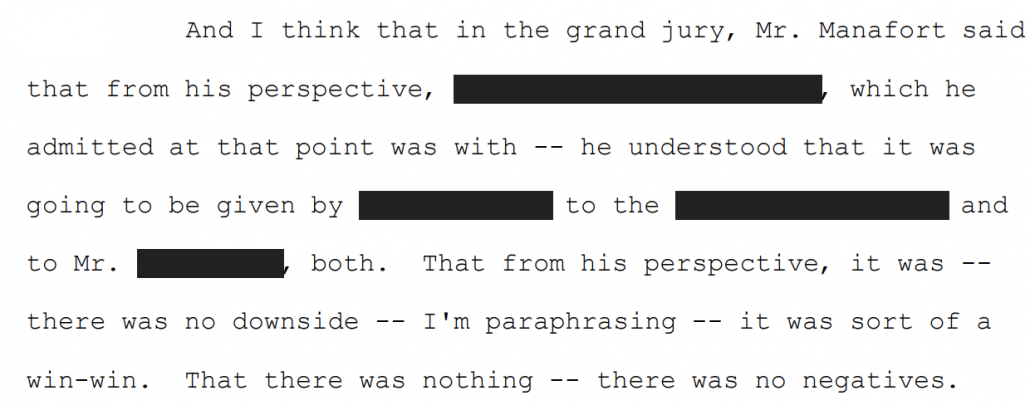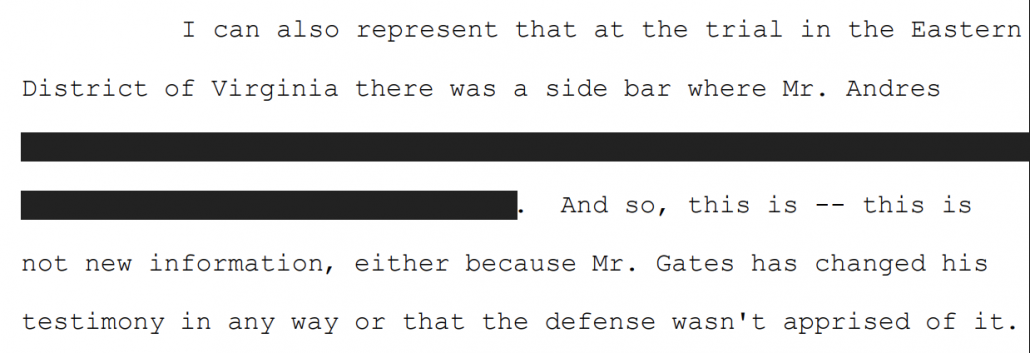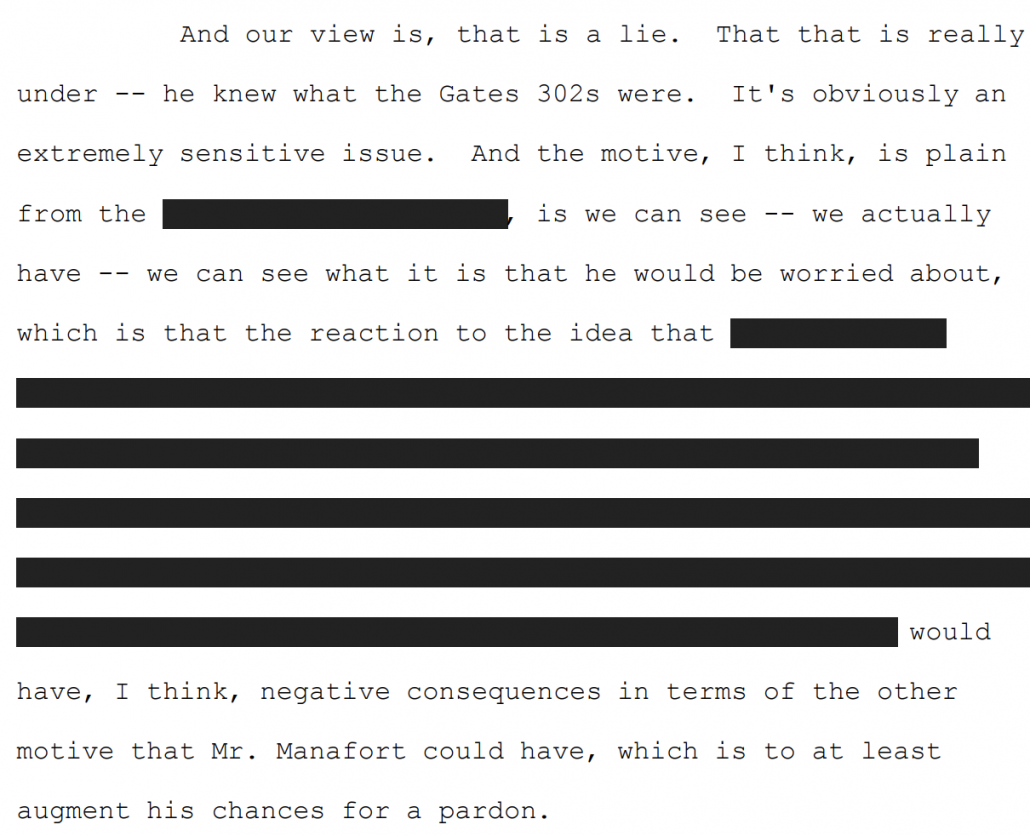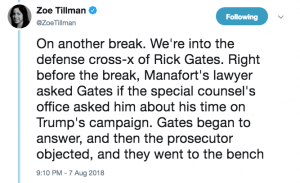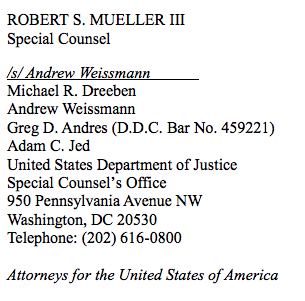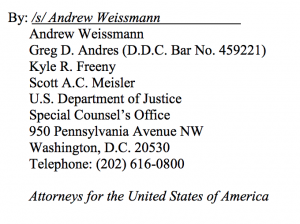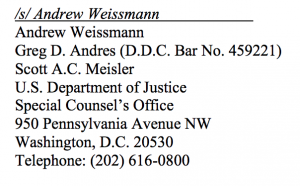The Ongoing Proceeding into Paul Manafort’s Kevin Downing-Related Texts
Yesterday, Judge Amy Berman Jackson finally released texts between Paul Manafort and Sean Hannity that she first considered releasing on April 29. While lots of people are looking at the texts, I haven’t seen any reporting on why we got them — or the significance of the texts we didn’t get.
ABJ received those texts on February 26 of this year as Attachment F to the government’s sentencing memorandum. They are one of at least seven attachments to an attachment to the memorandum objecting to the probation office’s presentence investigation report into Manafort — presumably making an argument noting that he contemptuously violated ABJ’s gag order. The government appears to have first objected to the PSR on February 14.
Importantly, there’s another set of communications, Attachment 7, that ABJ didn’t release yesterday that are the subject of an ongoing proceeding of some sort.
Amy Berman Jackson considered referring Kevin Downing for criminal contempt
On the same day as Manafort’s sentencing (where the government objection did not come up), on March 13, ABJ issued an order for a hearing on March 22 to explain why she, “should not institute proceedings against [Manafort lawyer Kevin Downing] under Fed. R. Crim. Pro. 42 alleging a past violation of this Court’s” gag order. She also instructed both sides to tell her by March 19 whether the texts — Attachments 6 and 7 — should be filed on the public docket or not. The hearing on whether Downing should be sanctioned was postponed and ultimately held on April 2; a transcript of that hearing, with grand jury and privilege information redacted, should be released imminently. After the hearing, on April 25, ABJ asked both sides, again, if she should release Attachments 6 and 7. The government responded by May 17. Manafort’s lawyers only responded, in two separate filings, sometime after June 12. Which is what led ABJ to finally issue her order yesterday ordering that her March 13 order reviewing Downing’s behavior be released, the April 2 transcript be released in redacted form, and Attachment 6 — the texts released yesterday — be released with privacy redactions.
But ABJ did not release Attachment 7, the other set of texts (or some other kind of communication), because “Attachment 7 is covered by Federal Rule of Criminal Procedure Rule 6(e) and relates to ongoing matters, and therefore, it shall remain under seal.” That is, Attachment 6 — yesterday’s release — is neither covered by grand jury rules nor part of an ongoing matter. But Attachment 7 is.
Which raises questions about how the two sets of texts were obtained and what they show.
Manafort’s witness tampering probably retroactively disclosed his gag violation
It’s almost certain that the Manafort-Hannity texts weren’t discovered in real time. Had they been, it would have been Manafort’s second violation of his gag order, and a much more severe violation than his first (where he helped draft an op-ed defending himself that was published in Ukraine). Had the government found these in real time, it’s likely Manafort would have been jailed six months earlier than he ultimately was (as Manafort’s lifelong friend Roger Stone might be next week for second violation of ABJ’s gag order).
They probably, instead, were discovered as part of the government’s investigation into Manafort’s witness tampering last spring. The texts released yesterday span from July 14, 2017 to June 5, 2018. They appear to have been obtained via cell phone extraction of a phone owned by Manafort (note, too, that the time shown on the texts is UTC, not ET, something a lot of the commentary suggesting these are middle of the night chats gets wrong).
On May 25, 2018, just as ABJ was about to reconsider Manafort’s final attempt to show adequate liquid assets to get out of house arrest on bail, the government filed a sealed notice of the witness tampering Manafort and Kilimnik engaged in starting immediately after the Hapsburg project was first charged on February 23, 2018. That witness tampering was charged in a second superseding indictment obtained June 8, 2018. In a declaration submitted with the May 25 filing, FBI Agent Brock Domin noted that,
The government is actively investigating the evidence regarding Manafort and obstruction of justice while under home confinement, in violation of title 18, U.S.C. section 1512. I submit that there are pending investigative inquiries whose completion could be jeopardized by disclosure, and the outcome of which could be relevant to the Court’s determination regarding bail herein.
And prosecutors informed ABJ that,
During the next ten days, the government anticipates taking additional investigative steps pertinent to the investigation.
The cell phone extraction of these texts was likely one result of the pending investigative inquiries described on May 25.
One possible explanation for a cell phone extraction on June 5, 2018 is that, as a result of being informed by Manafort’s former consultants that Manafort and Kilimnik were trying to persuade them to lie, the government identified another cell phone Manafort was using and got a warrant to obtain that in advance of the June 8 superseding indictment. Indeed, among the very last texts are two where Manafort tries to convince Hannity that the witness tampering allegations — which he calls “jury tampering” — were bullshit.
Manafort may have thought they were bullshit (or, just as likely, was lying to Hannity about it). But they appear to have given the government probable cause to obtain a new copy of the contents of his phone, which would lead to the discovery of these texts, including abundant evidence that Manafort was violating his gag order, continually, from the time it was imposed.
To obtain these texts, the government likely obtained a new search warrant. But the other set of communications may have been obtained with some kind of grand jury process — perhaps a grand jury subpoena requiring that, in addition to testifying, a witness turn over all the texts he had with Manafort. That would be one reason why ABJ could not release that second set of texts (or whatever they are): if they were obtained through grand jury process, they would be (and are) protected by grand jury secrecy rules.
The Downing-Hannity outreach took place not long after Manafort learned he’d be facing tax charges
The Hannity-Manafort texts show that in the days before the latter was first indicted, the two had a plan to pre-empt the indictment with a media campaign. Because ABJ imposed a gag right away, that effort kept getting delayed, with Hannity asking for Manafort or his lawyer to go on his shows over and over, and with Manafort deferring first because of his gag order and his first violation of it (the publication in Ukraine of an op-ed defending him) and then by his ultimately futile efforts to get out of house arrest. On January 3, 2018, Manafort suggested that the filing of a civil complaint might give Downing a way around the gag order. On January 17, Manafort said he’d connect Downing with Greg Jarrett on background. On January 24, 2018, Manafort told Hannity he needed to brief him on something. So even before January 25, the texts make it clear that both Manafort and one of his lawyers were violating ABJ’s gag.
But in threatening a criminal contempt referral, ABJ pointed, “in particular, [to] the communications dated January 25, 2018, found on pages 26-27 of Attachment 6.” Those are the texts that make it clear — because Manafort referred to Downing ahead of time and discussed their call after the fact — that Downing was the Manafort lawyer who violated the gag.
On January 24, 2018, after telling Hannity he needed to brief him on something, Manafort confirmed that Downing would speak with Hannity the next day, on January 25 at 11:30 AM. The next morning, Manafort reminded Hannity again. Later that day, Manafort asked Hannity how the call went, and Hannity said that Downing needed to send him stuff every day.
Something happened that made Manafort willing to violate his gag order (and ask his lawyer to violate his gag) where beforehand he had some hesitation.
One of the things that likely happened is that, sometime in the days leading up to January 16, the government informed Manafort and Gates they were filing new (tax) charges within a month.
GREG ANDRES: We’ve notified both defendants of our intention to bring additional charges. Those charges — the venue for those charges don’t lie in this district. So we asked each of the defendants whether they would be willing to waive venue so that those charges could be brought before Your Honor and all of those issues be tried together. One defendant agreed to waive venue, the other defendant did not.
So our intention is to move forward in a separate district with those separate charges. We just wanted the Court to be aware of that. The government’s view is that shouldn’t prevent the Court from setting a trial date because those issues will all be before a different court in a different district and not before Your Honor. And again, we’re asking for a trial date so that we can get this case moving and scheduled. But we certainly wanted the Court to be aware of that additional fact.
THE COURT: All right. Do you have a sense of the timing of that?
MR. ANDRES: You know, there are different variables, but we’re hoping within the next 30 days to have that indictment returned.
Among the things Hannity and Manafort discussed later in the day after Hannity spoke with Downing were the new charges Manafort had learned about prior to the January 16 hearing.
Manafort may also have had a sense that Gates was considering flipping. After all, at some point in January, he and Gates discussed pardons, but Manafort was unable to promise Gates that he would get one.
In January 2018, Manafort told Gates that he had talked to the President’s personal counsel and they were “going to take care of us.”848 Manafort told Gates it was stupid to plead, saying that he had been in touch with the President’s personal counsel and repeating that they should ” sit tight” and “we’ll be taken care of.”849 Gates asked Manafort outright if anyone mentioned pardons and Manafort said no one used that word.850
In the days after Downing and Hannity first spoke — on January 29, 30, and 31, 2018 — Gates would have his first known proffer discussions with Mueller’s team, discussions that likely led to the Hapsburg charges filed the same day the new tax charges were filed.
When Gates flipped, a month later, Hannity asked Manafort if Gates had given him a heads up. Manafort never responded.
That suggests he may not have been honest with Hannity in real time about his risks.
Also of note, the first thing Hannity raised in the same conversation after he and Manafort spoke was Jared Kushner.
In other words, the Downing contact with Hannity happened at a time when Manafort had to have realized he was in much deeper shit than he was telling Hannity. He likely realize that the new charges — cut-and-dry tax charges — were far more likely than the untested FARA charges to land him in prison, where he would have to trust Trump to bail him out with a pardon.
What are the ongoing matters that prevent disclosure of the second set of texts?
All that provides one possible explanation for why Manafort decided it’d be a good idea to put his lawyer directly in touch with Hannity, in violation of her gag order. But that doesn’t explain the other reason ABJ decided not to release the second sent of texts: some “ongoing matters” that require the communications remain secret.
It’s possible that she did refer Downing, as she threatened to do, for criminal contempt (!!!). [See update: she did not.] Except if that were the case, both sets of texts would pertain to an ongoing matter. It appears that Attachment 7 is more important to those ongoing matters than Attachment 6, which we got yesterday.
There’s one other notable date in that time period. As I’ve noted, the Downing – Hannity discussions came just before Howard Fineman reported, on January 30, 3018, not only that Trump planned to beat Mueller by having Sessions investigate him…
Instead, as is now becoming plain, the Trump strategy is to discredit the investigation and the FBI without officially removing the leadership. Trump is even talking to friends about the possibility of asking Attorney General Jeff Sessions to consider prosecuting Mueller and his team.
… But also reported that Trump was confident that Manafort would not flip on him.
He’s decided that a key witness in the Russia probe, Paul Manafort, isn’t going to “flip” and sell him out, friends and aides say.
Chris Ruddy was one source for the Fineman story. And Ruddy was interviewed by the FBI about his knowledge of Trump’s efforts to obstruct justice on June 6, 2018, the day after the FBI extracted the Hannity texts from Manafort’s phone.
On Monday, June 12, 2017, Christopher Ruddy, the chief executive ofNewsmax Media and a longtime friend of the President’s, met at the White House with Priebus and Bannon.547 Ruddy recalled that they told him the President was strongly considering firing the Special Counsel and that he would do so precipitously, without vetting the decision through Administration officials.548 Ruddy asked Priebus if Ruddy could talk publicly about the discussion they had about the Special Counsel, and Priebus said he could.549 Priebus told Ruddy he hoped another blow up like the one that followed the termination of Corney did not happen.550 Later that day, Ruddy stated in a televised interview that the President was “considering perhaps terminating the Special Counsel” based on purported conflicts of interest.551 Ruddy later told another news outlet that “Trump is definitely considering” terminating the Special Counsel and “it’s not something that’s being dismissed.”552 Ruddy’s comments led to extensive coverage in the media that the President was considering firing the Special Counsel.553
547 Ruddy 6/6/18 302, at 5.
548 Ruddy 6/6/18 302, at 5-6.
549 Ruddy 6/6/ l 8 302, at 6.
550 Ruddy 6/6/18 302, at 6.
551 Trump Confidant Christopher Ruddy says Mueller has “real conflicts” as special counsel, PBS (June 12, 2017); Michael D. Shear & Maggie Haberman, Friend Says Trump ls Considering Firing Mueller as Special Counsel, New York Times (June 12, 2017).
If you’re going to contact one of Trump’s close media allies — Hannity — to send Trump an ultimatum about Manafort and get the media person on board for a plan to undercut Mueller, you’re likely to contact Trump’s other closest media ally, Chris Ruddy.
None of that answers what Downing had to explain to Hannity and what the ongoing proceeding might be. But it does suggest that Ruddy was in the same kind of discussion circle in January 2018 as Hannity was.
ABJ’s timing
I’m particularly curious about ABJ’s persistent interest in releasing these Attachments and her timing. Here’s what the docket for the month of June looks like:
599 (June 6): Unrelated order on encumbered property
[June 6: first John Solomon report]
600: Sealed filing
601 (June 12): ABJ Order unsealing the April 2 hearing transcript
602: Manafort
603: Manafort
604: Sealed filing, with Sealed copy of Attachment 6
[June 19: second John Solomon report]
605 (June 21): Order releasing materials
606 (June 21): Docketed copy of Attachment 6
As noted in bold, there’s still two sealed filings, dockets #600 and #604 (though 604, which includes a sealed copy of Attachment 6, must relate to this issue). Some time since June 6 — perhaps not coincidentally the first of two John Solomon reports that appear to be based off Manafort discovery — Manafort finally responded to ABJ’s order on unsealing.
In other words, this publication of Downing’s contempt for ABJ’s gag order comes as some other reporting seems to align not just with the narrative that Manafort was pushing for the entirety of his chats with Hannity, but seems to rely on perspective that Manafort’s lawyers seem uniquely well suited to have.
But it also comes as ABJ prepares to deal with Manafort’s lifelong friend Roger Stone latest violation of her gag order, who seems to be showing similar signs of contempt for Judge Jackson.
Update: While it’s almost certainly a coincidence, the Manafort outreach to Hannity happened just days before, on January 27, someone impersonating Hannity got Julian Assange to respond to her DM and direct her to a different communications channel. Assange was dealing Hannity information on Mark Warner (probably about his discussions with Adam Waldman).
Also, CNN (which appears to have paid for the newly unredacted transcript, which will otherwise become available July 2) notes that ABJ decided not to do anything with the texts unless prosecutors showed more of a pattern.
The texts were released along with the transcript of an April hearing where Judge Amy Berman Jackson was considering whether Manafort or his attorney Kevin Downing had violated a gag order through the communications.
Jackson decided to have the lawyers involved in the case determine what, “if any,” portions of the texts and hearing transcript should be publicly released once “some portion of the Mueller Report becomes publicly available.”
In the transcript of the April 2 hearing, Jackson says she is unlikely to do anything more with the texts.
“And absent further information from the government that there were more communications, I’m unlikely to do anything beyond today,” she said.
As I disclosed last July, I provided information to the FBI on issues related to the Mueller investigation, so I’m going to include disclosure statements on Mueller investigation posts from here on out. I will include the disclosure whether or not the stuff I shared with the FBI pertains to the subject of the post.





